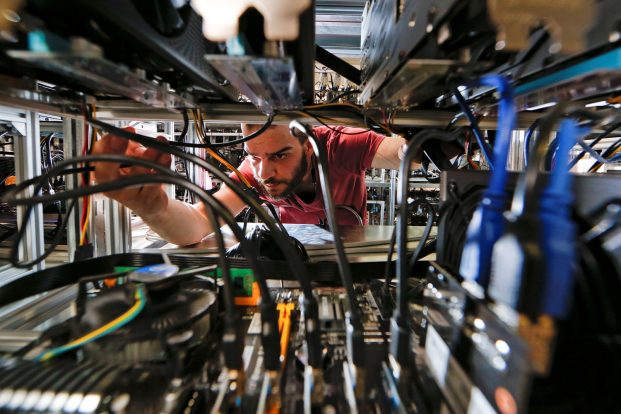(ATF) China’s burgeoning cryptocurrency sector has taken a double blow this week as a leading short-seller called one of the country’s most prominent players a scam and a new study said China could fail its energy emission goals due to coal-intensive bitcoin mining operations.
US-based Hindenburg Research said on Tuesday it was going short on Ebang International Holdings, sending the Chinese bitcoin mining machine producer’s shares down as much as 20%.
The company’s Nasdaq-listed stocks closed at $5.53 on Tuesday, down 12.9%.
“Ebang claims to be a ‘leading bitcoin mining machine producer’, yet our research indicates this extraordinary claim is backed by no evidence,” the short seller said in a report. “Ebang released its final miner in May 2019 and has since seen its sales dwindle to near-zero,” Hindenburg said
With the decline of its mining equipment business, Ebang pivoted to a cryptocurrency exchange called Ebonex, Hindenburg said. “Announcements about the exchange added as much as $922 million market capitalisation to Ebang,” the short-seller said.
“Ebonex reports what appears to be fictitious volumes,” it alleged. “Despite just launching and having virtually no online presence, Ebonex volume data implies it is one of the largest spot exchanges in the world. Its trading metrics are absent from crypto exchange trackers such as FTX and CoinMarketCap.”
FUNDRAISING EFFORTS
The Hangzhou-based company debuted on Nasdaq in June last year and had conducted two fundraising rounds in February alone, raking in $170 million.
Before going public in June 2020, Ebang twice applied for an initial public offering (IPO) on the Hong Kong Stock Exchange, attempting to raise as much as $1 billion, the Hindenburg report said.
“Multiple media outlets reported that Ebang’s Hong Kong IPO plans were suspended following involvement in an alleged sales inflation scheme with a company called Yindou,” the short-seller noted.
Hindenburg said its research had revealed that instead of using capital proceeds to develop its business, Ebang directed much of the cash out of the company through “a series of opaque deals with insiders and questionable counterparties.”
It said Ebang directed $103 million – about $11 million more than its entire IPO proceeds – into bond purchases linked to US underwriter, AMTD, “which has a track record including (a) fraud and self-dealing allegations levied against it by one of the largest private equity firms in China and (b) listings that have subsequently imploded”.
UNDERMINING CLIMATE
Meanwhile, a study in Nature, the US science journal, said China’s electricity-hungry bitcoin mines that power nearly 80% of the global trade in cryptocurrencies risk undercutting the country’s climate goals.
Bitcoin and other cryptocurrencies are minted by solving puzzles using powerful computers that consume enormous amounts of electricity – much of it produced by coal-fired power stations.
Their energy consumption is so large they could end up undermining Beijing’s pledge to peak carbon emissions before 2030 and become carbon neutral by 2060, it warned.
The Nature study found that China’s bitcoin mines will generate more than 130 million tonnes of carbon emissions by 2024 – close to the annual greenhouse gas emissions from Italy or oil-rich Saudi Arabia.
The authors urged Beijing to develop a policy “which induces changes in the energy consumption structure of the mining activities” to limit carbon emissions of bitcoin operations.
With reporting by Agence France-Presse and Reuters






















